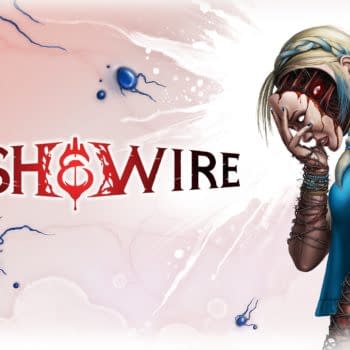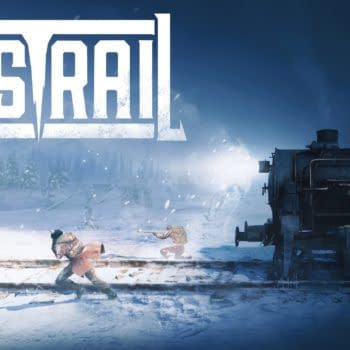Posted in: Card Games, Games, Magic: The Gathering, Tabletop, Wizards of the Coast | Tagged: Archenemy, magic, MTG, Scheme, TCG, WotC
Magic: The Gathering: Archenemy, Pt. 11: Nature Versus Nothingness
Hello and welcome, all players, collectors, and other fans of Magic: The Gathering, the premier collectible trading card game designed, developed, and produced by Wizards of the Coast! In the previous two-thirds of our installment about Archenemy, we went over various themes that seemed pretty appropriate for each of the blocks of three schemes cards we went over that week. We aren't stopping today, folks! This week our theme is considering the age-old question of nature versus nurture, but for good (or is it evil? We shall insert our mustache twirling here!) measure, we have decided to add a third option: nothingness. Are you ready? We know we are, so let's go!

As usual, we will be giving an explanation of our analyses for Archenemy scheme cards below:
All Schemes will be grouped according to the overall role they play: These groupings are categorized as such:
Disruption: The Schemes take something from your opponents (and only them) that doesn't exist on the battlefield. This could be cards in hand, life, or choices like the ability to attack or cast spells.
Global: These Schemes impact each player with less disparity than the other Schemes in the game. Usually there will be an even effect for each player including the archenemy and/or their opponents, for a certain duration or instantaneously.
Removal: These Schemes remove opponents' permanents from the battlefield. These are rather self-explanatory, but could include the need for an opponent to make a tough decision.
Tempo: These Schemes give you as the Archenemy (and only you) some sort of expedited value, such as ramp, cards drawn, or even an extra turn, to name a few examples.
Value: These Schemes give you as the Archenemy (and only you) something such as tokens or cards put onto the battlefield, to name a few resources potentially granted this way. This does not include resources such as sources of mana or drawn cards, however.Next, the Schemes will be grouped further on a scale of 1-10 in terms of how well they do their job in the role provided, with 1 being rather underpowered and 10 being broken.
(For example, All In Good Time is a 9/10 for a Tempo Scheme, while Approach My Molten Realm is a 3/10 for a Global Scheme.)
Does that clarify our analyses better? Good. Let's delve into it now!
#31. Nature Demands an Offering
Nature Demands an Offering (Removal, 2/10) is a rather… Okay, it's a bad scheme card, only for the simple fact that your opponents make the decision as to which permanents from your opposition's battlefield they are the most okay with tucking away into libraries. If it were up to you, you'd easily remove the scariest cards on their boards. However, while one "target opponent" has the final say about what gets tucked, the decision is ultimately made as a collective, meaning the savviest opponent is the only actual target to make the decision. Therefore, as the Archenemy sets this scheme into motion, you will always be removing the worst possible permanents from the battlefield. And sure, this could be offset by your opponents only having one of a certain permanent type out, but that's unlikely considering the sheer number of opponents who are facing you at one time. And goodness forbid we even mention tokens! 2 out of 10 only because it hits multiple targets – though we'd be more comfortable giving it less if we could. On from nature to nurture!
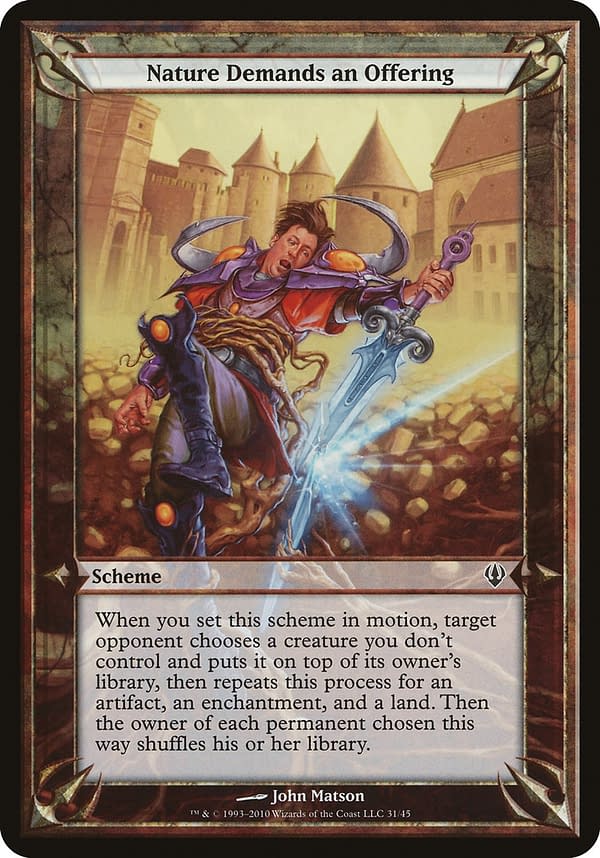
#32. Nature Shields Its Own
Nature Shields Its Own (Value, 7/10) is a good ongoing scheme card if you need to rely on Aristocrats' strategies in order to do your work. So long as your opponents' creatures do not have trample or other forms of evasion and you're not being overrun by too many of them, this scheme will provide sufficient value for your death-to-value pipeline. You won't even need to block! However, if you're running this scheme you can't expect it to stay in use for too long because your opponents will not want you to be able to reap any advantages whatsoever, because you're evil and they're not. But ultimately, this is good as a meatshield machine for one round of play while you get your next stage of planning into motion. Our only other question is this: Why show a flying creature being blocked by these Plants? The tokens don't have reach. Or because the blockers made aren't being declared as blocking, but simply enter as such, are we good against flying creatures too? Please let us know in the comments, any Magic judge-types reading this!
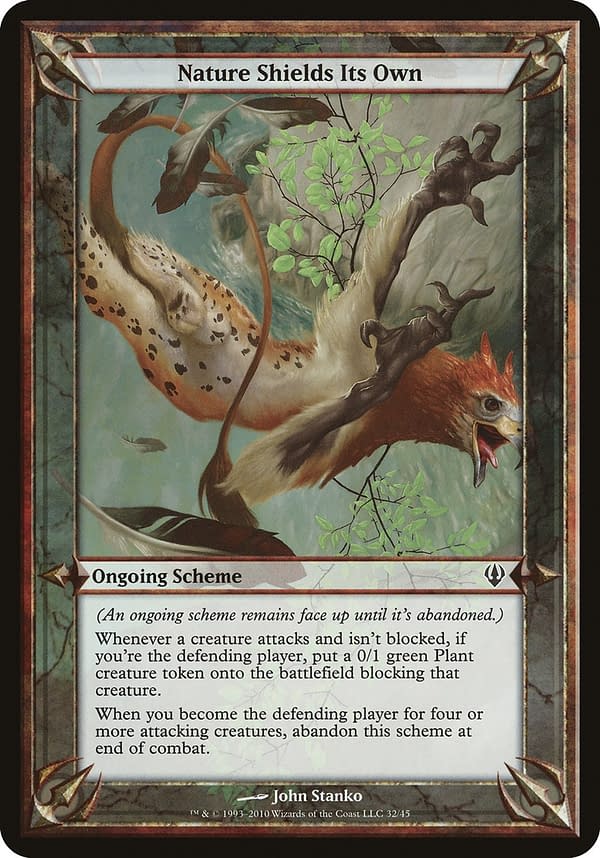
#33. Nothing Can Stop Me Now
Nothing Can Stop Me Now (Disruption, 6/10) is another ongoing scheme card that mitigates combat, but also does quite a bit more and quite a bit less in almost-equal measure. The scheme gives you a pseudo-Urza's Armor ability, which can stop 1-power creatures and burn pretty well, but if you get overrun by your opponents, much like with Nature Shields Its Own, it goes away quite fast. This scheme is arguably worse than that one because it doesn't give you much-expedited value despite doing more of the same, so that's why it's ranked as a six instead of equal or higher than Nature Shields Its Own.
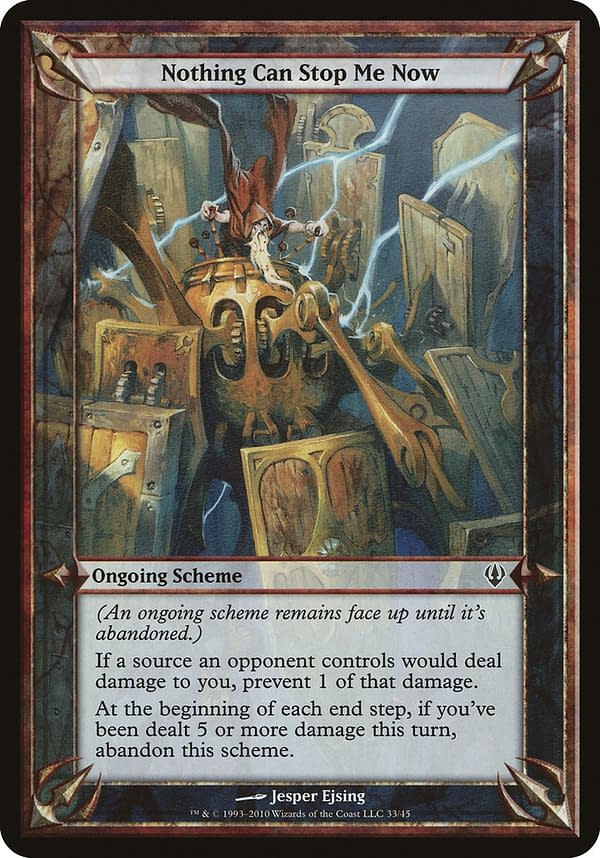
What do you think about our Archenemy article series so far? From here, we only have four entries left until we look at the promo cards and then Archenemy: Nic9ol Bolas! Meanwhile, do you think that Magic: The Gathering should rehash these cards, Planechase, or Vanguard cards? Let us know your thoughts in the comments below!










